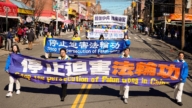【新唐人2013年05月30日讯】继中共出台“9号文件”规定“七不讲”后,日前,多家中国媒体刊载,中共中央组织部、宣传部和教育部党组,联合下发“十六条”意见,来加强高校青年教师的思想政治工作。有分析说,继“七不讲”后,“十六条”更直白表达当局思想控制的意图。
5月4号,《关于加强和改进高校青年教师思想政治工作的若干意见》出台。
“意见”指出:“少数青年教师政治信仰迷茫、理想信念模糊、职业情感与职业道德淡化……不能为人师表”,“意见”中强调,有关各级加强领导和管控,并要求教师“强化政治理论学习,深入开展马克思列宁主义、毛泽东思想、中国特色社会主义理论体系教育,深入学习实践科学发展观”等。
河南驻马店教师许鸿宾表示,这是中共当局要进一步加强思想管控,目地就是为了加强所谓“党的领导”。
河南驻马店教师许鸿宾:“是加强思想控制的一个办法吧,和前面的‘七不讲’,是不是和那个有关系呀!青年教师好像思想比较活跃,好像是普世价值他们怕这个吧。不过我们感觉到好像是在这方面,往这方面使劲好像不大对头,应该把关注的精力放在腐败上。”
5月上旬,网上传出中共当局对高校教师下达“七个不要讲”内容,要求教师教学中不要讲“普世价值、 新闻自由、公民社会、公民权利、中共的历史错误、权贵资产阶级、司法独立”等。
据报导,“七不讲”文件下发至县团级,其中说道:宣扬“普世价值”的核心目地,是排除党的领导;而“公民社会”的主张,是要在基层党组织外,建立新的政治势力;“新自由主义”理念,是反对国家进行宏观调控;提倡“西方新闻观念”,是反对党一贯坚持的“喉舌论”,要摆脱党对媒体领导,搞苏联当年改革时推行的“公开化”,用搞乱舆论来搞乱党、搞乱社会。
时事评论员林子旭表示,从中大家可以看到一个规律,中共强调什么的时候,就说明中共在哪方面很薄弱了,甚至出现了危机。
时事评论员 林子旭:“中共撰文要求加强青年教师的思想政治工作,文章里甚至用到了高度重视、切实加强等词汇,这就是中共很明显的在告诉大家,当下学校里的青年教师的思想已经严重偏离了‘伟、光、正’,这让中共非常的恐惧,因为老师对整个社会的下一代影响非常大,这些老师的思想引导,就决定了中共的意识形态是不是还能继续维持的问题。”
林子旭表示,他在上大学的时候已经感觉,三、四十岁的年轻教师大多有自己的思想,不管教什么课程的老师,和学生们熟悉了之后,他们往往会说出一些针砭时弊的话来,而且学生们对这些话非常感兴趣。
林子旭:“到了今天,网路如此发达,这些年轻教师几乎是人手一个智能手机,人人看微博,他们的思想一定是更加的活跃开放,接触到了外部世界的信息以后,中共的那些宣传在他们心里就是垃圾。说白了,中共的思想和自由世界思想的矛盾,就是党性和人性的矛盾。中共的那套连他们自己都不信的垃圾理论,就根本找不到市场了。”
“中国政法大学”青年讲师、法学学者滕彪,对《德国之声》表示,近期中共当局在意识形态领域,不断透过御用文人之口传递出“七不讲”、包括对青年教师思想管控的“十六条”,显示出当局对网络化时代自由言论难以控制的焦虑。
滕彪表示,任何一个正常而健康的社会,政治都不能干扰和绑架学术。他说,正常的社会,不可能用一种统一的意识形态,来控制整个教育、新闻、和宣传系统,只有中国这种体制下,才有控制言论、统一思想的必要。
采访编辑/常春 后制/王明宇
The CCP’s"Sixteen Recommendations" more Censors on Expression
Recently, the Chinese Communist Party (CCP) has imposed
the “Seven will not Speak"policy.
Following “Seven Don’t Mentions", the Central Committee’s
Organization Department, Propaganda Department and
the Ministry of Education jointly issued “16 recommendations"
which were published by several Chinese media.
The advise is to strengthen young professors’ ideological
and political works in the universities.
Analysts said that apart from “Seven Don’t Mentions",
the “16 recommendations" more directly expresses
the CCP’s intention on mind control.
On 4th May, “Advice on Strengthening and
Improving Young Professors’Ideological and
Political Works” (ADVICE) was issued.
ADVICE states: Some young professors confused
in political and ideology beliefs, professional emotion
and ethics have faded, thus,
they can’t serve as a model of virtue.
ADVICE stressed that the relative-levels must
strengthen the management and control.
It requires professors to strengthen the study of political
theory, deeply carrying out education of Marxism-Leninism,
Mao Zedong Thought and Chinese characteristic socialism.
As well as carrying out an in-depth study and
practicing the scientific development concept.
Xu Hongbin, a teacher in Zhumadian, Henan Province said that
the moves indicated that the CCP designed further
strengthening on ideological control.
Its purpose is to emphasize the CCP’s leadership.
Xu Hongbin: “It is a method the CCP uses to
strengthen the control of thought.
The question arises, whether it is connected with
the previous “Seven Don’t Mentions"?
Young professors seem to have active thinking,
the CCP may fear this based on universal values.
However, in this regard, we think it isn’t correct
to make any efforts in this direction.
They should focus on corruption issues."
In early May, the policy of “Seven Don’t Mentions" that
the CCP has imposed on university professors,
has been circulating on the internet.
It has instructed the professors not to teach seven subjects,
including “universal value, freedom of press, civil society,
citizen rights, past mistakes of the CCP, the privileged
capitalist class and judicial independence.
Sources said that"Seven Don’t Mentions"document
was issued down to the county-level.
Document stated that, to teach"universal value,
is to get rid of the Party-leadership;
The idea of “civil society" establishes
new political forces outside the CCP;
The “neo-liberalism" philosophy is
to go against the state macro-control;
Promotion of the “Western news concept" is to rule out
the CCP has consistently adhered on media control, and
is to follow the Soviet Union’s implementation of
openness reform,
as well as to mess up the CCP and
disturb society with public opinion.
Lin Zixu, current affairs commentator said that people can find
a theory from this: when the CCP emphasizes something,
it means the weakness on that area is more weakened,
furthermore, the CCP is facing a crisis.
Lin Zixu:"The CCP issues a document for young professors
to strengthen ideological and political works.
The document even uses words of “pay high attention"
and"earnestly strengthening".
It obviously tells everyone that, currently, in the universities,
young professors’ minds have seriously deviated from the CCP’s
so-called ways of always being “Great, Glorious and Correct. “
Lin Zixu said that when he studied at university,
he noticed that the majority of young professors had independent thought.
No matter which course of professors,
when they get familiar with students,
they would share their criticism from
their heart about current affairs.
The students were very interested in these topics.
Lin Zixu: “Nowadays, the network is very advanced,
each young professor almost has a smart phone in hand.
They read microblogs with their thoughts
being very active and open.
After they read the outside world’s information,
the CCP’s propaganda becomes rubbish in their mind.
Put it simply, the CCP’s ideology contradicts with
the one from the free world. It is the CCP and humanity’s contradiction.
The CCP’s garbage ideology which even itself doesn’t believe,
is finding it impossible locate a market."
Teng Biao, a young lecturer in China University of
Political Science told Deutsche Welle that recently,
the Chinese regime constantly promotes
“Seven Don’t Mentions" via its writers,
including the promotion of its “16 recommendations".
It indicates the CCP worries that free expression in
the networking era is beyond its control.
Teng Biao said that in any normal and healthy society,
politics wouldn’t interfere and control the academic field.
Teng said that in a normal society, it is impossible
to use one ideology to control the entire education,
press and propaganda systems.
Only within the CCP’s system, the CCP thought it is
necessary to control expression and unify thought.































